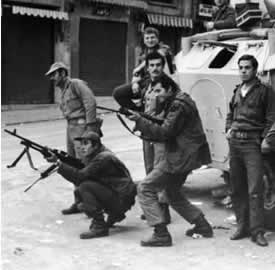 Lebanon's militant Hezbollah group denied a report by a German magazine linking it to the 2005 assassination of former Lebanese Prime Minister Rafik Hariri, saying Sunday that it was an attempt to tarnish its image before parliamentary elections.
Lebanon's militant Hezbollah group denied a report by a German magazine linking it to the 2005 assassination of former Lebanese Prime Minister Rafik Hariri, saying Sunday that it was an attempt to tarnish its image before parliamentary elections.Saturday's report in the weekly Der Spiegel came at a time of rising tensions before the crucial June 7 elections, which could result in the Western-backed government being ousted by a Hezbollah-led coalition supported by Syria and Iran. Hezbollah said the Der Spiegel report was based on "fabrications."
Hariri's assassination has deeply divided the country. His supporters blamed Syria for the killing, a charge Damascus denies, but no one had ever accused Hezbollah of being involved.
A Hezbollah legislator dismissed the Der Spiegel report as "a big lie."
"We are waiting for the international tribunal to react and to see where the German magazine got its information from," Nawar Saheli told The Associated Press Sunday.
The group also indirectly accused Israel, saying it believed those who gave the magazine its information sought to draw attention away from Lebanon's recent arrests of people suspected of spying on Hezbollah for Israel.
Der Spiegel said in its Saturday report, which it said was based on sources close to the tribunal and verified by internal documents, that the investigation had reached the conclusion about Hezbollah's involvement about a month ago.
The report said that the assassins used eight cellular telephones bought on the same day in the northern city of Tripoli. One of them made the mistake of calling his girlfriend with one of the phones, revealing his identity.
The report also linked the explosives and the truck used in the attack to the Shiite militant group.
Last month, four Lebanese generals were released by the tribunal. They had been the only suspects in custody.
"The magazine's accusations are police fabrications made in the same black rooms that fabricated similar stories about the Syrians and the four generals," Hezbollah's statement said.
Prime Minister Fuad Saniora, a critic of Hezbollah, refused to comment on the report's allegations. "We want justice. We don't give weight to any words said here or there," Saniora told Al-Arabiya TV. "We have put trust in the tribunal and we don't care to what the newspapers say."
After reading the Der Spiegel report, Israeli Foreign Minister Avigdor Lieberman called for the arrest of Hezbollah leader Sheik Hassan Nasrallah. "If this is the conclusion of the investigators an international arrest warrant must be issued immediately against Nasrallah," he said.
Four years ago, U.N. investigator Detlev Mehlis said the complexity of the assassination plot suggested a role by Syrian intelligence services and its pro-Syrian Lebanese counterpart. During a news conference in Beirut, Mehlis had said Hezbollah was not involved in Hariri's assassination. An early draft of a report he issued in 2005 linked Syrian President Bashar Assad's inner circle but the two investigators who succeeded him did not repeat the accusations and said Syria was cooperating.

 The security cabinet is expected to discuss on Wednesday the ramifications of a Lebanese cabinet policy statement giving Hizbullah the right of "resistance" to "liberate Lebanese territories."
The security cabinet is expected to discuss on Wednesday the ramifications of a Lebanese cabinet policy statement giving Hizbullah the right of "resistance" to "liberate Lebanese territories."  Heavy fighting erupted again Wednesday between pro- and anti-government supporters in northern Lebanon, killing at least three people and wounding 32 others and shattering a fragile truce that lasted just two weeks, security officials said. Five soldiers were among the wounded in clashes in the northern city of Tripoli that began overnight and continued Wednesday morning, the officials said, speaking on condition of anonymity because they were not authorized to talk to the media.
Heavy fighting erupted again Wednesday between pro- and anti-government supporters in northern Lebanon, killing at least three people and wounding 32 others and shattering a fragile truce that lasted just two weeks, security officials said. Five soldiers were among the wounded in clashes in the northern city of Tripoli that began overnight and continued Wednesday morning, the officials said, speaking on condition of anonymity because they were not authorized to talk to the media.